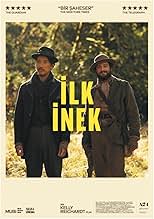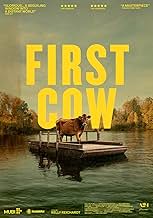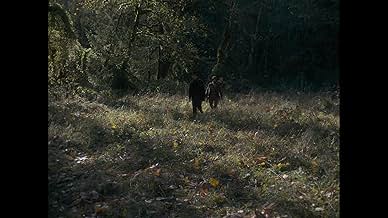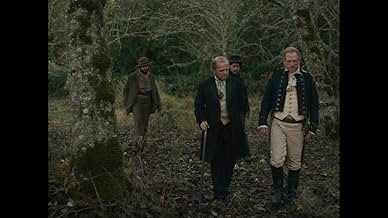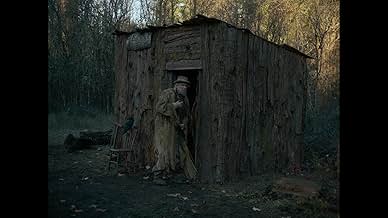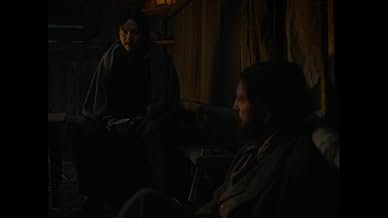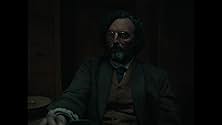PUNTUACIÓN EN IMDb
7,1/10
23 mil
TU PUNTUACIÓN
Un cocinero con talento viaja hacia el oeste y se une a un grupo de comerciantes de pieles en Oregón, donde entabla amistad con un inmigrante chino que también busca fortuna.Un cocinero con talento viaja hacia el oeste y se une a un grupo de comerciantes de pieles en Oregón, donde entabla amistad con un inmigrante chino que también busca fortuna.Un cocinero con talento viaja hacia el oeste y se une a un grupo de comerciantes de pieles en Oregón, donde entabla amistad con un inmigrante chino que también busca fortuna.
- Premios
- 28 premios y 158 nominaciones en total
Rene Auberjonois
- Man with Raven
- (as René Aubergenois)
Kevin Michael Moore
- Fort Trapper
- (as Kevin-Michael Moore)
Argumento
¿Sabías que...?
- Curiosidades"Slow Elk" was suggested as an alternate title, as that's how cattle were known to Oregon's First People. Also, "slow elk" is still a slang term for cattle used by big game hunters in some Western states; for example, "That out-of-stater shot a slow elk by mistake."
- PifiasCookie mentions he would like to have a business in San Francisco. The film is ostensibly set in the 1820s, when the city had not officially been named San Francisco. However, the name had been in use since the 1590s and could have been used at the time the film is set.
- Créditos adicionalesThe Cow - Evie
- ConexionesFeatured in WatchMojo: Top 10 Movies of 2020 (So Far) (2020)
Reseña destacada
"It's the getting started that's the puzzle. No way for a poor man to start. ... You need capital, or you need some kind of miracle."
"You need leverage."
"Or a crime."
Another excellent Western from Kelly Reichardt, one with high production quality and which quietly subverts the genre's traditional themes. That starts with the two protagonists, King-Lu and Cookie (Orion Lee and John Magaro) who are rational, somewhat timid guys who hit on a plan to make a fortune via baked goods (yes, baked goods). Cookie is quite the domestic for the hero of a Western, and can crank out a clafoutis if necessary. The buddy he meets, King-Lu, is from China but is the antithesis of stereotypical representations, having traveled the world and multi-lingual, including English and the local Native American dialect. How fantastic is it that these guys aren't macho gunslingers, that they cook, sew, sweep the house, and forage while trying to figure out how to take advantage of this "land of riches." Meanwhile, the Native Americans themselves aren't blood-thirsty savages, they're people and they co-exist with the colonizers, which is reasonably accurate for the 1820's, a few decades before mass colonization would lead to genocide.
Despite the relative harmony, there is a quiet, rather ominous danger everywhere, from a bully in the fur trapping group promising to wait outside the fort after Cookie is paid to rob him, to King Lu describing how his friend was gutted from neck to loin because he was suspected of being a thief, to the more powerful men who debate how many lashes are appropriate in corporal punishment which is clearly at their discretion. There is no real law and order here, just force, and might makes right. At the same time, Reichardt is incredibly restrained in not showing a lot of violence, or reveling in it as a lesser director might have done.
Meanwhile, the message comes through that the West wasn't won with frontier spirit or some other aspect of mythical American exceptionalism, it was won with crime. Sure, the two mild-mannered fellas with big dreams steal milk from a rich guy's cow to make some delicious oily cakes, setting up a pop-up food stall (ok food blanket) that's quite popular with the locals, enriching themselves in the process. But the rich guy is stealing resources from the Native Americans and idiotically believes that the beaver can be trapped without limit. When he's told by King-Lu how vast the original beaver population was in the state, he can't extrapolate what greed will do to the population eventually, or doesn't want to (and indeed, the beaver was almost driven to extinction in Oregon). The little thieves end up in shallow graves, the big thief ends up likely lauded in the state's history, with a town probably named after him.
The first cow (fantastically played by Evie the cow btw) is thus a symbol of the natural order shifting, and in a profound way. Early on in a small saloon, one man remarks "This ain't a place for cows. God would've put cows here if it was." Another replies "No place for white men either then." It's notable that the cow is there so a rich man can have cream in his tea, and so he can display his status and sophistication to visitors who might look down on his rustic surroundings. It's a luxury, and reserved for him alone. It's the tip of an enormous iceberg, of many more white men with their precious possessions, of a lifestyle that will ravage the environment for the sake of personal wealth. In the opening shot in the present day, an enormous (and very ugly) cargo barge is seen going down the river. It's a shot I almost forgot by the time the film ended, but it seems to show in a subtle way the result of 200 years of such a lifestyle.
That's an aspect of Reichardt's direction I admire most, just how much she holds back and lets the viewer think about. There is a powerful message here, but it's delivered with great subtlety. Most of the scenes are played without a soundtrack in the background, and she doesn't feel a need to include shots to fill everything in for the viewer. There were places where I felt the film could have moved along a little more quickly and it won't be for everyone, but the more I thought about it afterwards, the more I appreciated what she had done.
Another excellent Western from Kelly Reichardt, one with high production quality and which quietly subverts the genre's traditional themes. That starts with the two protagonists, King-Lu and Cookie (Orion Lee and John Magaro) who are rational, somewhat timid guys who hit on a plan to make a fortune via baked goods (yes, baked goods). Cookie is quite the domestic for the hero of a Western, and can crank out a clafoutis if necessary. The buddy he meets, King-Lu, is from China but is the antithesis of stereotypical representations, having traveled the world and multi-lingual, including English and the local Native American dialect. How fantastic is it that these guys aren't macho gunslingers, that they cook, sew, sweep the house, and forage while trying to figure out how to take advantage of this "land of riches." Meanwhile, the Native Americans themselves aren't blood-thirsty savages, they're people and they co-exist with the colonizers, which is reasonably accurate for the 1820's, a few decades before mass colonization would lead to genocide.
Despite the relative harmony, there is a quiet, rather ominous danger everywhere, from a bully in the fur trapping group promising to wait outside the fort after Cookie is paid to rob him, to King Lu describing how his friend was gutted from neck to loin because he was suspected of being a thief, to the more powerful men who debate how many lashes are appropriate in corporal punishment which is clearly at their discretion. There is no real law and order here, just force, and might makes right. At the same time, Reichardt is incredibly restrained in not showing a lot of violence, or reveling in it as a lesser director might have done.
Meanwhile, the message comes through that the West wasn't won with frontier spirit or some other aspect of mythical American exceptionalism, it was won with crime. Sure, the two mild-mannered fellas with big dreams steal milk from a rich guy's cow to make some delicious oily cakes, setting up a pop-up food stall (ok food blanket) that's quite popular with the locals, enriching themselves in the process. But the rich guy is stealing resources from the Native Americans and idiotically believes that the beaver can be trapped without limit. When he's told by King-Lu how vast the original beaver population was in the state, he can't extrapolate what greed will do to the population eventually, or doesn't want to (and indeed, the beaver was almost driven to extinction in Oregon). The little thieves end up in shallow graves, the big thief ends up likely lauded in the state's history, with a town probably named after him.
The first cow (fantastically played by Evie the cow btw) is thus a symbol of the natural order shifting, and in a profound way. Early on in a small saloon, one man remarks "This ain't a place for cows. God would've put cows here if it was." Another replies "No place for white men either then." It's notable that the cow is there so a rich man can have cream in his tea, and so he can display his status and sophistication to visitors who might look down on his rustic surroundings. It's a luxury, and reserved for him alone. It's the tip of an enormous iceberg, of many more white men with their precious possessions, of a lifestyle that will ravage the environment for the sake of personal wealth. In the opening shot in the present day, an enormous (and very ugly) cargo barge is seen going down the river. It's a shot I almost forgot by the time the film ended, but it seems to show in a subtle way the result of 200 years of such a lifestyle.
That's an aspect of Reichardt's direction I admire most, just how much she holds back and lets the viewer think about. There is a powerful message here, but it's delivered with great subtlety. Most of the scenes are played without a soundtrack in the background, and she doesn't feel a need to include shots to fill everything in for the viewer. There were places where I felt the film could have moved along a little more quickly and it won't be for everyone, but the more I thought about it afterwards, the more I appreciated what she had done.
- gbill-74877
- 4 oct 2021
- Enlace permanente
Selecciones populares
Inicia sesión para calificar y añadir a tu lista para recibir recomendaciones personalizadas
Detalles
- Fecha de lanzamiento
- País de origen
- Sitio oficial
- Idiomas
- Títulos en diferentes países
- İlk İnek
- Localizaciones del rodaje
- Empresas productoras
- Ver más compañías en los créditos en IMDbPro
Taquilla
- Recaudación en Estados Unidos y Canadá
- 101.068 US$
- Fin de semana de estreno en EE. UU. y Canadá
- 81.323 US$
- 8 mar 2020
- Recaudación en todo el mundo
- 1.380.888 US$
- Duración2 horas 2 minutos
- Color
- Relación de aspecto
- 1.37 : 1
Contribuir a esta página
Sugerir un cambio o añadir el contenido que falta






